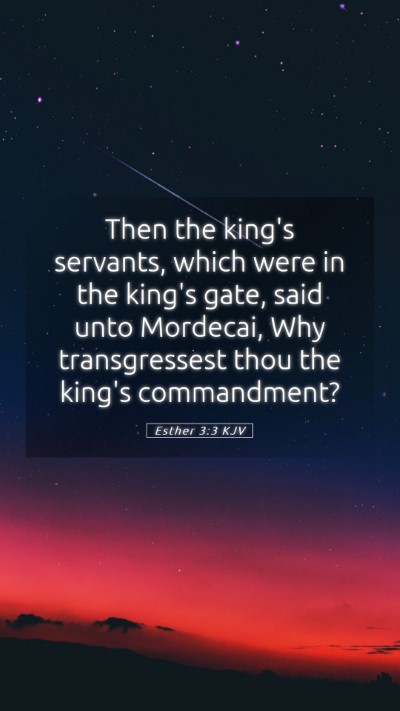Old Testament
Genesis Exodus Leviticus Numbers Deuteronomy Joshua Judges Ruth 1 Samuel 2 Samuel 1 Kings 2 Kings 1 Chronicles 2 Chronicles Ezra Nehemiah Esther Job Psalms Proverbs Ecclesiastes Song of Solomon Isaiah Jeremiah Lamentations Ezekiel Daniel Hosea Joel Amos Obadiah Jonah Micah Nahum Habakkuk Zephaniah Haggai Zechariah MalachiEsther 3:3 Meaning
What is the meaning of Esther 3:3?
Then the king's servants, which were in the king's gate, said unto Mordecai, Why transgressest thou the king's commandment?
Esther 3:3 Bible Verse Meaning
Bible Verse Meaning of Esther 3:3
Esther 3:3: "Then the king's servants, who were in the king's gate, said to Mordecai, 'Why do you transgress the king's command?'"
General Overview
The verse is a pivotal moment in the Book of Esther that highlights the conflict between Mordecai and Haman, setting the stage for the events that follow. The inquiry by the king's servants emphasizes the significance of loyalty to the king's decrees.
Commentary Insights
-
Matthew Henry's Commentary:
Henry notes that Mordecai's refusal to bow to Haman was essential in demonstrating his loyalty to God and Jewish customs. His defiance indicates a deeper relationship with his faith, contrasting with the expectations of the Persian court.
-
Albert Barnes' Notes:
Barnes emphasizes the social and political implications of Mordecai's actions. By not bowing, Mordecai challenges the authority of Haman, which incites a series of events that lead to potential disaster for the Jewish people. This act of defiance is portrayed as necessary for the preservation of his cultural identity.
-
Adam Clarke's Commentary:
Clarke provides insight into the cultural context, explaining that bowing was a custom of respect, and Mordecai's refusal signified a repudiation of idolatry. This highlights the theme of faith vs. earthly power, as Mordecai chose divine allegiance over social protocol.
Key Themes and Analysis
Several significant themes arise from this verse:
- Faithfulness to God: Mordecai's refusal to bow exemplifies unwavering commitment to his faith and identity as a Jew, underscoring the importance of spiritual loyalty in the face of opposition.
- The Danger of Compromise: The interaction between the king's servants and Mordecai illustrates the pressure to conform to societal expectations, raising questions about how faith can sometimes conflict with cultural norms.
- Political Intrigue and Repercussions: This scene introduces Haman as an antagonist, revealing the dangerous nature of power dynamics and the consequences that arise from personal vendettas.
Historical Context
The Book of Esther takes place in the Persian Empire during the reign of King Ahasuerus (often identified with Xerxes I). Understanding the political landscape of the time provides insight into Mordecai's predicament. Jews were a marginalized group within the empire, and their survival depended on navigating complex political relationships.
Application of Esther 3:3 in Daily Life
This scripture encourages readers to evaluate their own priorities and the values they hold. It poses the question: to what extent are we willing to stand for our beliefs, despite external pressures?
Cross References
- Daniel 3:16-18: Shadrach, Meshach, and Abednego's refusal to bow to an idol mirrors Mordecai's faithfulness.
- Exodus 20:5: The command against idolatry reinforces the reasons behind Mordecai's refusal.
- Acts 5:29: The apostles' insistence on obeying God over men echoes Mordecai's stance.
Conclusion
Esther 3:3 serves as a powerful reminder of the significance of standing firm in one’s faith, even when faced with societal pressure. It highlights themes of identity, loyalty, and the challenges of living out one's beliefs in a complex world. By studying this verse and its context, believers can enhance their Bible study insights and grow in their understanding of Scripture.


